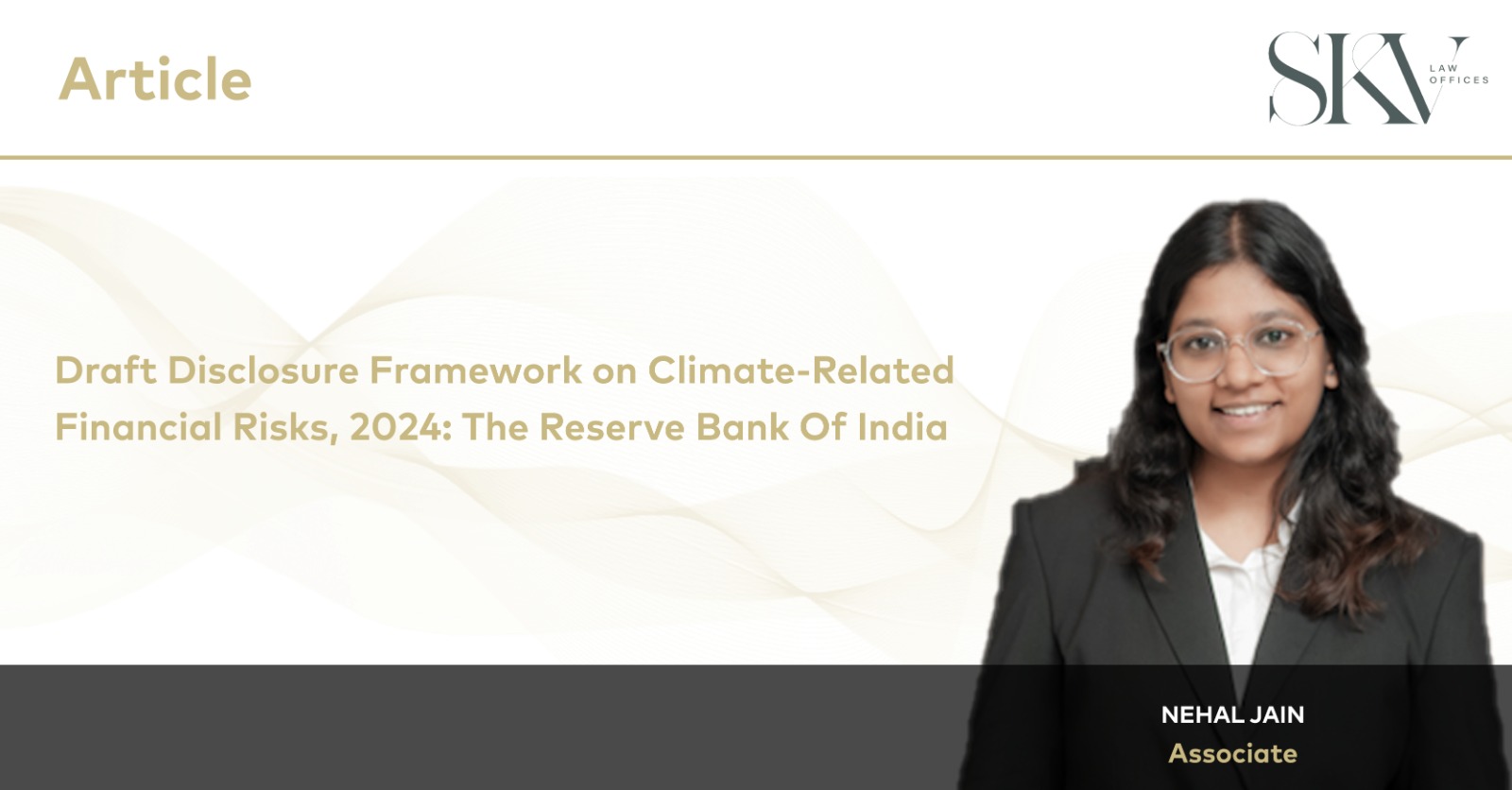Draft Disclosure Framework on Climate-Related Financial Risks, 2024: The Reserve Bank of India
26.05.2024
Authored by: Nehal Jain, Associate
In a significant move towards addressing the growing concerns surrounding climate change and its potential financial impacts, the Reserve Bank of India (“RBI”) has unveiled a draft disclosure framework on climate-related financial risks. This pioneering initiative marks a pivotal moment in India’s financial landscape, signalling the central bank’s commitment to integrating environmental considerations into the country’s financial sector.
BACKGROUND
Climate change presents a multifaceted challenge, encompassing environmental, social, and economic dimensions. The financial sector, in particular, faces significant exposure to climate-related risks, including physical risks stemming from extreme weather events, transition risks associated with shifts to a low-carbon economy, and liability risks arising from legal and regulatory changes. Recognizing the systemic implications of these risks, central banks worldwide have increasingly been incorporating climate considerations into their regulatory and supervisory frameworks.
THE RBI’S INITIATIVE
The RBI’s draft disclosure framework represents a proactive response to the evolving landscape of climate-related risks. By mandating financial institutions to disclose information on their exposure to such risks, the central bank aims to enhance transparency, facilitate informed decision-making, and promote the integration of climate factors into risk management practices. The framework underscores the RBI’s dual mandate of maintaining financial stability and promoting sustainable development.
KEY FEATURES OF THE FRAMEWORK
- Scope and Applicability: The framework applies to banks, non-banking financial companies (NBFCs), and other regulated entities under the purview of the RBI. These entities are required to assess and disclose their climate-related risks and opportunities, considering both physical and transition risks across various sectors.
- Disclosure Requirements: Financial institutions are mandated to disclose qualitative and quantitative information on their exposure to climate-related risks, including data on carbon emissions, climate-related asset and liability portfolios, and strategies for managing such risks. Disclosure formats are aligned with international standards, such as the Task Force on Climate-related Financial Disclosures (TCFD), ensuring consistency and comparability.
- Scenario Analysis: Recognizing the importance of scenario analysis in assessing climate-related risks, the framework encourages financial institutions to conduct forward-looking assessments under different climate scenarios, such as a 2°C or higher warming trajectory. This enables institutions to evaluate the potential impact of climate change on their balance sheets and capital adequacy.
- Governance and Oversight: Effective governance and oversight mechanisms are integral to ensuring the robustness of climate risk management practices. The framework emphasizes the role of boards and senior management in overseeing climate-related disclosures and integrating climate considerations into strategic decision-making processes.
IMPLICATIONS AND WAY FORWARD
The RBI’s draft disclosure framework signifies a paradigm shift in how climate-related risks are perceived and managed within the financial sector. By promoting greater transparency and accountability, the framework not only enhances the resilience of individual institutions but also contributes to the overall stability of the financial system.
However, effective implementation of the framework hinges on several factors, including capacity building, stakeholder engagement, and ongoing monitoring and evaluation. Financial institutions will need to invest in data collection and analytical capabilities to comply with disclosure requirements effectively. Moreover, collaborative efforts between regulators, industry stakeholders, and civil society are essential to address data gaps, develop common methodologies, and foster a culture of climate risk awareness and management.
In conclusion, the RBI’s draft disclosure framework on climate-related financial risks represents a significant milestone in India’s journey towards building a more sustainable and resilient financial system. By fostering greater transparency and accountability, the framework lays the foundation for integrating climate considerations into mainstream financial decision-making, thereby contributing to India’s broader sustainability goals and global climate efforts. As the consultation process unfolds and the framework takes shape, it is imperative for all stakeholders to actively participate and contribute towards realizing the vision of a climate-resilient financial future.


